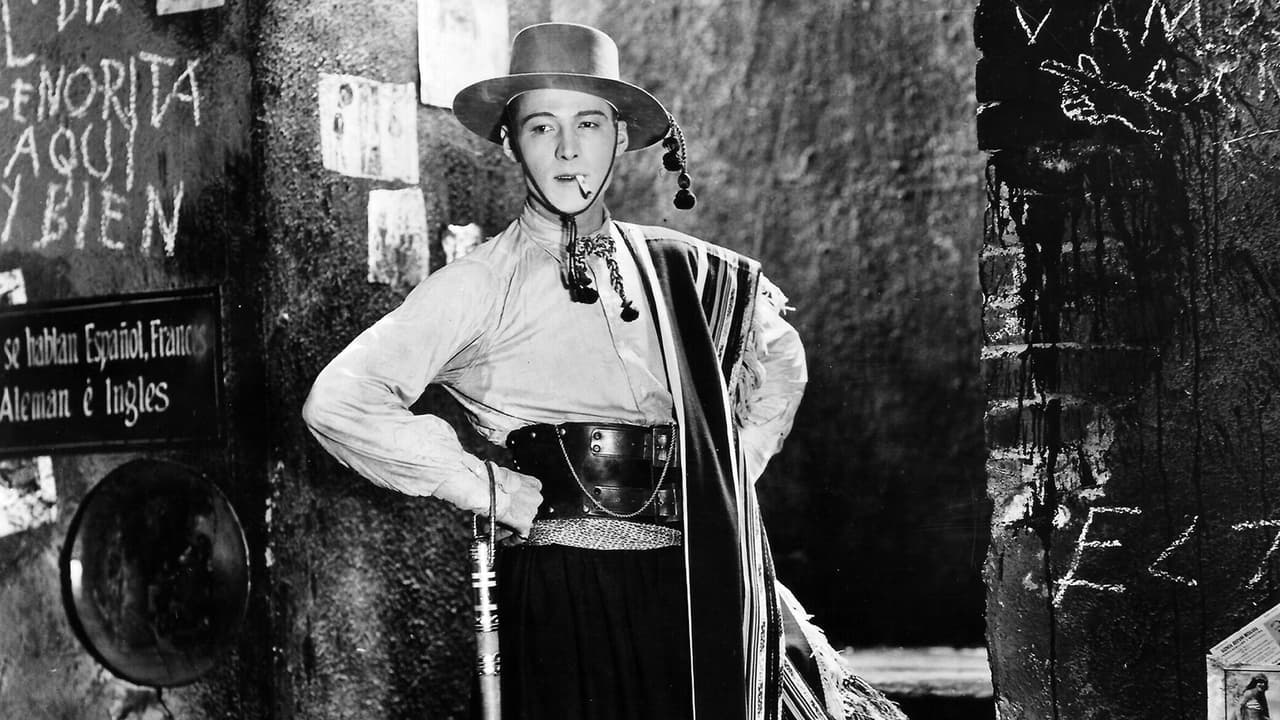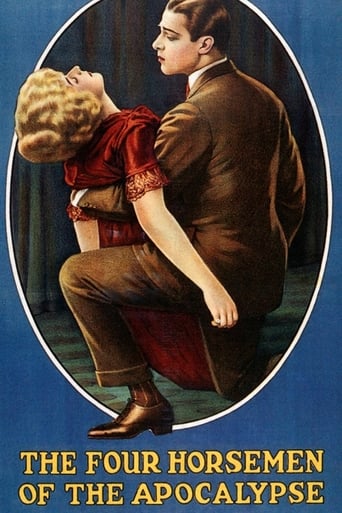

1st watched 10/20/2013 - 4 out of 10(Dir-Rex Ingram): Heavy handed anti-war movie comes across very one-sided as far as the perspective on a war between Germany and France in this epic family drama, love story & war movie wrapped into one package. Rudolph Valentino plays a son of a Parisian who departed to Argentina fleeing the country from an earlier conflict, but returns after his grand-father's demise. The son has a weakness for the woman-folk and becomes involved with the wife of one of his German cousins causing scandal between the two families. He is an artist who lives off his father's money until he decides to join the cause of the war. The four horsemen come into play as an allegory against the biblical reference(referred to in the movie as an old book) in Revelations where each horsemen represents a different side of the results of war activity and the movie does some special effects introducing these horsemen at different points of the movie. Rudolph's father hordes antiques in an old castle in France, but it's destroyed by the German's in an almost naturally occurring guilty verdict on his original escape from the draft. This is a departure from the rest of the movie's otherwise emotionally pointed view about the negative perspective on war. There is not much detail given to the war only that Germany is the conqueror and France takes the blunt of their blows. I believe the piece would have been stronger if the motivations of both sides would have been revealed better. The romance in the story is lessened and seems to just be an opportunity to show off the good looking Valentino's occasional dancing with the ladies. I'm sure the actual re-percussions of World War I prompted the novel and the movie and this played real well to packed houses in America when it first came out, but doesn't play as well to the current age. Overall, I just didn't see that the movie made it's point very effective -- which appeared to be that war should be avoided. In my opinion it wasn't bold enough in it's assessment.
... View MoreValentino was in New York when he read in a trade paper that this movies was going to be made. He had already read the book and wanted to play the tango scenes. He had much experience with the Brazilian Tango when he made his living as a "Taxi Dancer" (A dancer that is picked up by a partner and paid for the time he dances with them - like a taxi) in New York. When he came back to Los Angeles to inquire about the tango scene in the movie, he learned that the casting office had been looking for him and already wanted him to play the part of Julio. He was so thrilled! Some people aren't aware that Valentino had come to Los Angeles in the first place because he wanted to work in agriculture. He was tired of taxi dancing and he also had been involved in a scandal in New York that ruined his reputation as a dancer. When he filled out an application to work at Metro studios, the question on the application asked "Why do you want to work in movies?" Valentino wrote the answer "Tired of ballroom dancing." Valentino loved to dance. Many times he kept a dancing job on the side before he was making big money. Then he still danced for fun.
... View MoreThink of this film and you'll probably instantly envisage Valentino dancing the tango in his gaucho outfit. It's one of those enduring images - and it also perpetuates the myth that he was forever in costume dramas, leering with wild eyes at some swooning female in his embrace. In fact, that tango is almost insignificant other than as a device to show the audience the allure Valentino's character has over women. For the most part, he's dressed in expensive designer suits (which he bought himself and spent a year paying for, apparently) and looks surprisingly contemporary. It's not difficult to see why he blew the women away when they saw him in this - he was incredibly handsome.The film certainly has that epic quality, but the acting leaves much to be desired. Even by the standards of 1921, when Griffith was promoting the use of tiny gestures to demonstrate deep emotions, some of the acting here is wildly over the top. Valentino probably isn't quite as guilty as the worst culprits, but he comes pretty close.I saw the Glenn Ford version a couple of years ago. It was panned upon its release, and still doesn't have much of a reputation. I thought it was OK, even though Ford was badly miscast. Overall, this film is vastly superior, but in terms of realism the 60s version has this one beaten hands down.
... View MoreFour Horsemen of the Apocalypse, The (1921) *** (out of 4) Rudolph Valentino does the tango here and with that one scene he became a household name, one of the biggest stars around and forever put his name in the books of Hollywood legend. The Argentinean Madariago (Pomeroy Cannon) has two daughters; one who marries a a French guy and one who marries a German against his wishes. The French daughter has a son named Julio (Valentino) who quickly because his grandfather's favorite but after Madariago dies, the two families movie back to the husband's home countries and soon afterwards WW1 breaks out. Julio, who lived as a playboy, must choose if he wants to give his lifestyle up and join the war. This legendary film from Rex Ingram certainly lives up to its reputation even though some of the anti-war feelings are a little backwards. There's no doubt the film is against the war but at the same time the film paints Valentino as a coward for not wanting to fight in the war. How can you have an anti-character in an anti-war film being shown as a coward? Outside of that this is a very impressive film and what also impressed me was the tinting used by Ingram. For the most part the film is shown in a brown tint but it also switches back to your typical B&W footage while yet again changing to a red tint for the horsemen scenes. The horsemen scenes are very well done and I thought that the special effects still looked quite good. The few battle scenes in the film look nice as well. The performances are all very good with Valentino giving the best performance I've seen from him in the eight or so movies I've watched of his. He's very good during the romance scenes but he also proves himself quite well in the dramatic department. Cannon, Josef Swickard, Alice Terry and Brinsley Shaw are also good in their roles. Wallace Beery is good in his few scenes as a German officer.
... View More